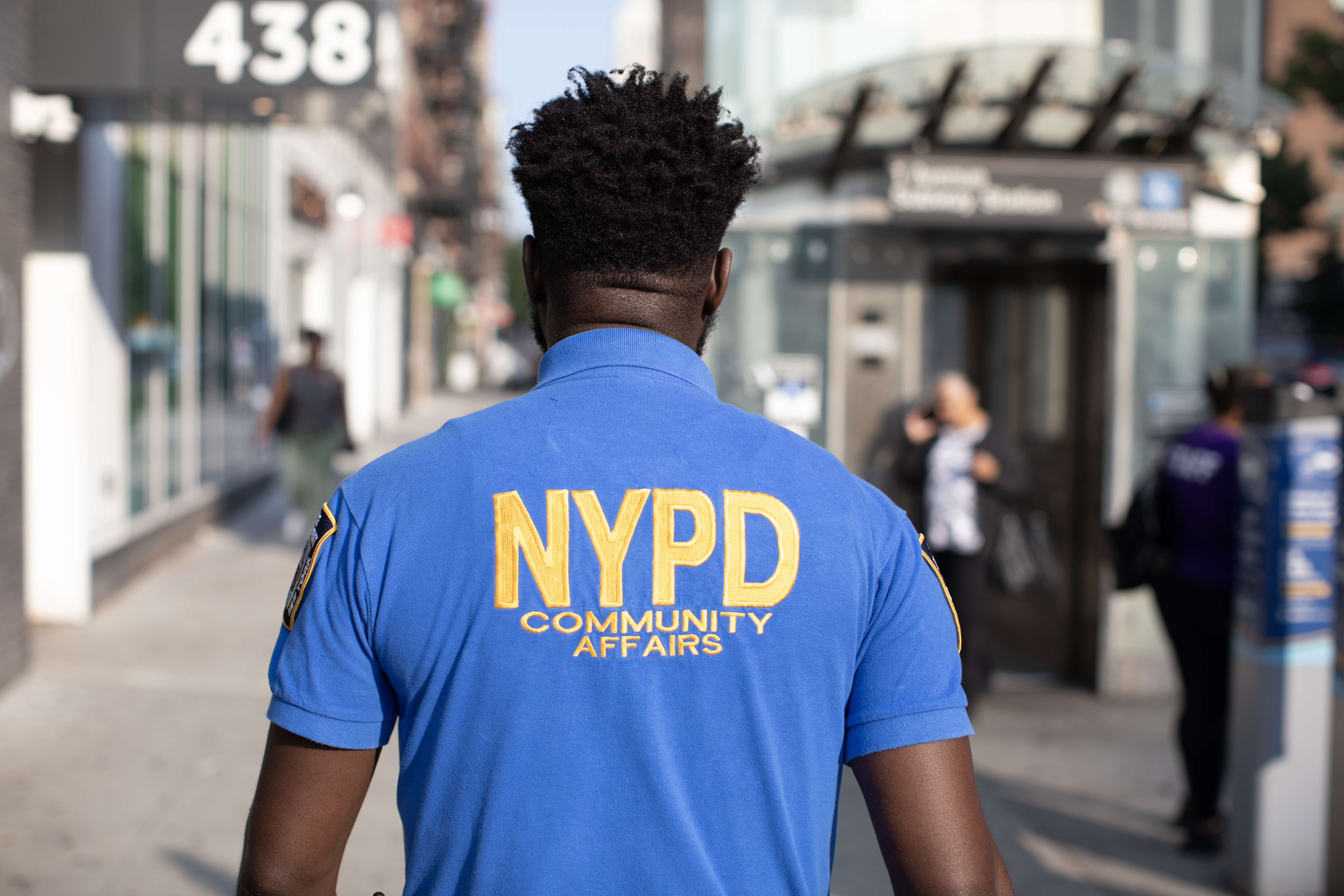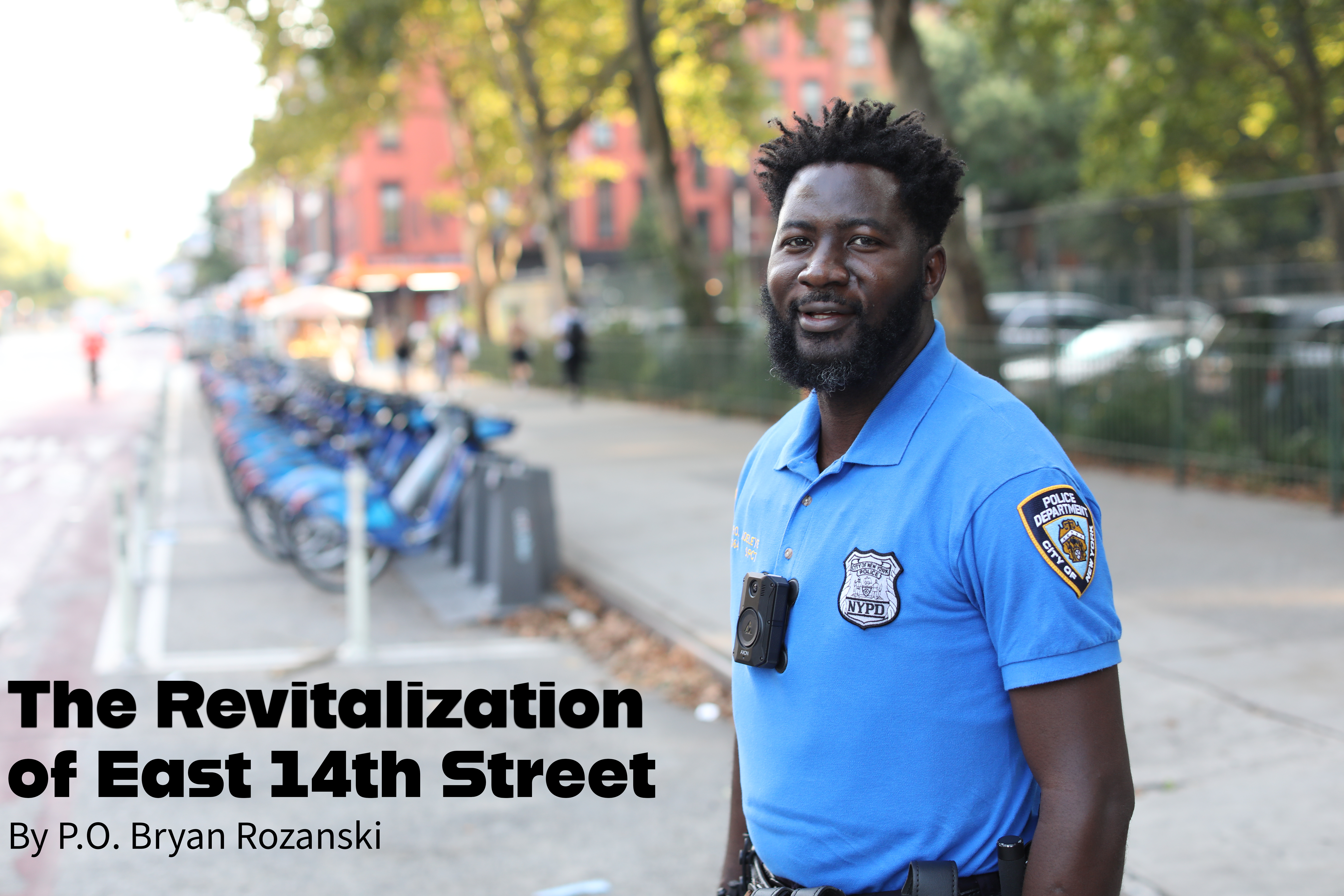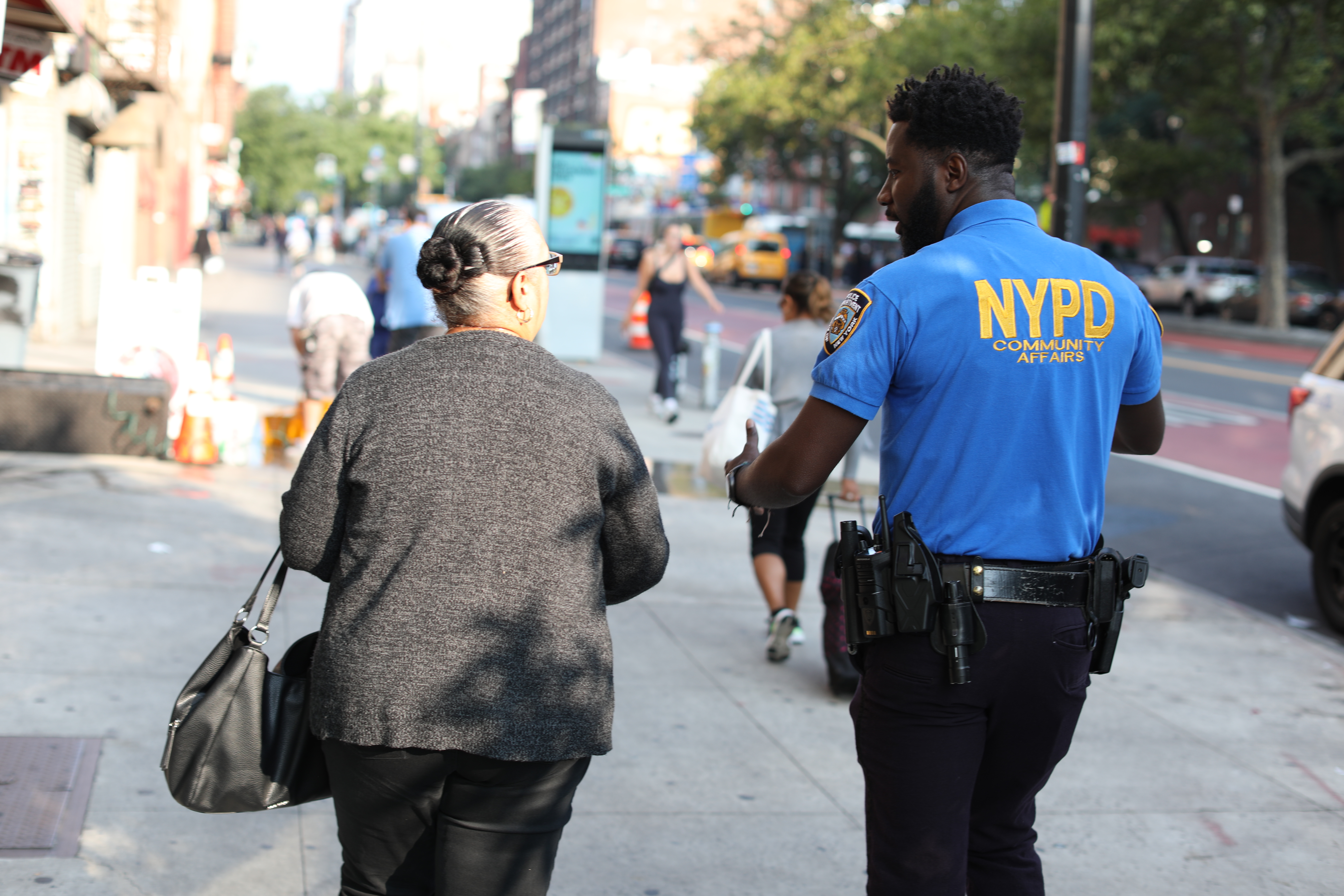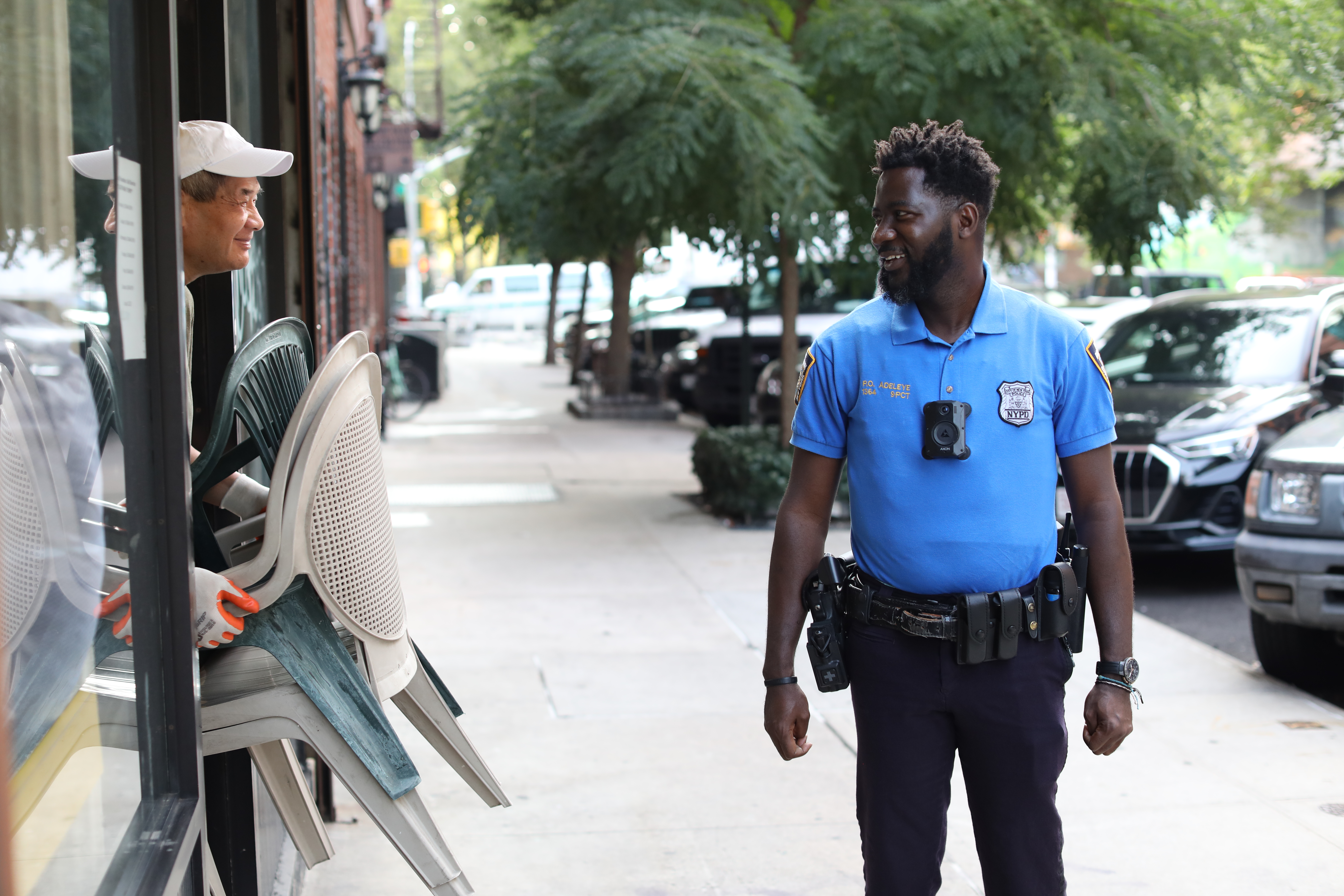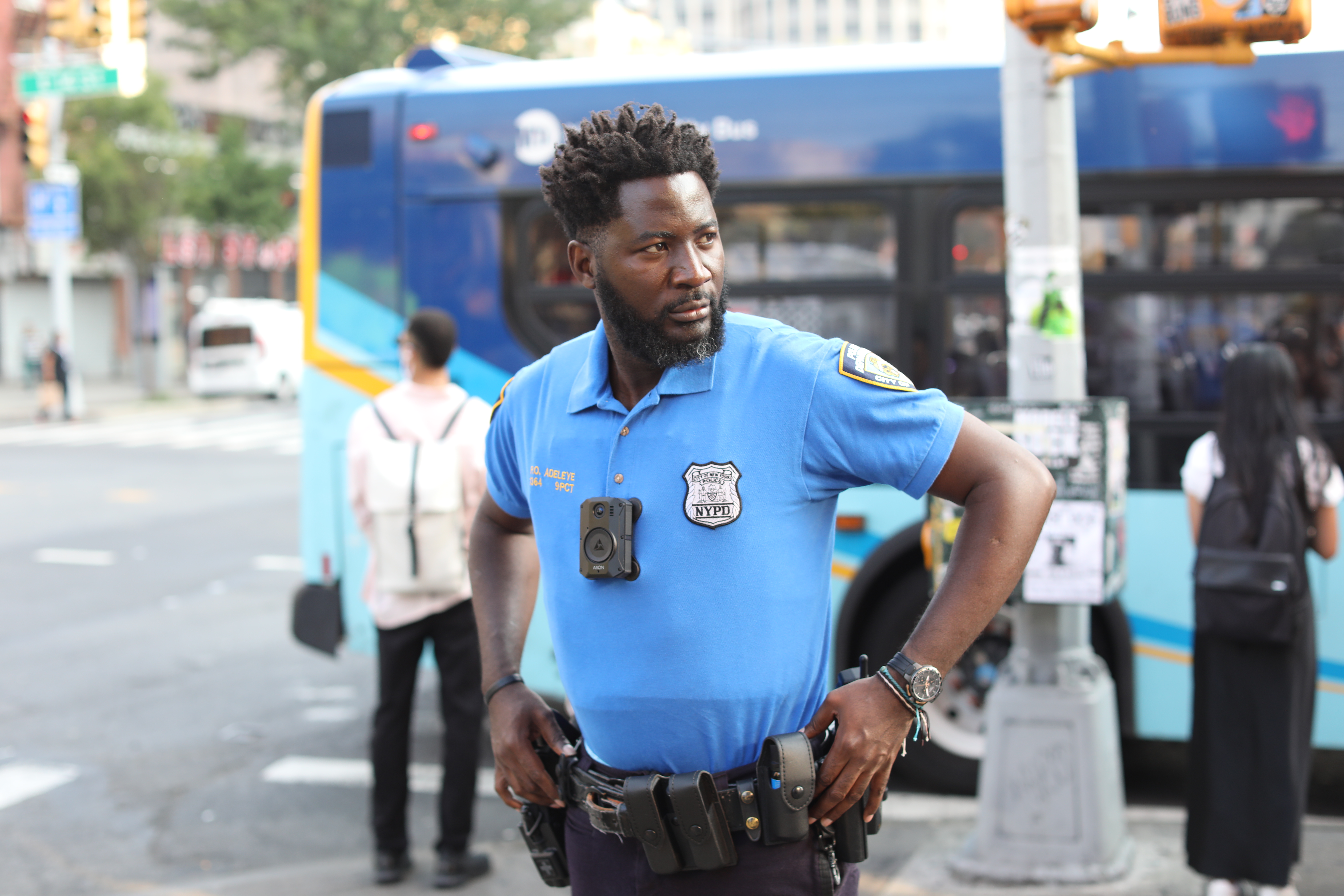The Revitalization of East 14th Street
August 20, 2024
Eugene Adeleye was just two months shy of his 22nd birthday when he arrived, alone, at Kennedy Airport carrying his life’s possessions: $50 in cash, a single, small suitcase half-filled with clothes, and a deep desire to succeed—at something.
Adeleye had been the lucky but apprehensive winner of a one-way plane ticket to New York in 2007, courtesy of Nigeria’s now-defunct Diversity Visa Lottery. If he went, though, he had no idea what he would do for work in the United States, or where he would even lay his head at night. Still, at the urging of his family, Adeleye reluctantly left behind everything he knew in favor of America’s promise to provide a life of significance.
Today, Adeleye is a New York City police officer whose efforts are making an enormous difference in the lives of his fellow New Yorkers.
As a Community Affairs cop assigned to the 9th Precinct in Manhattan, his day-to-day has him liaising with shopkeepers, street vendors, residents, tourists, and others. Many are immigrants like him, and he makes sure to truly hear their concerns so that he can help construct a plan that lowers crime where it exists and improves the neighborhood’s overall quality of life.
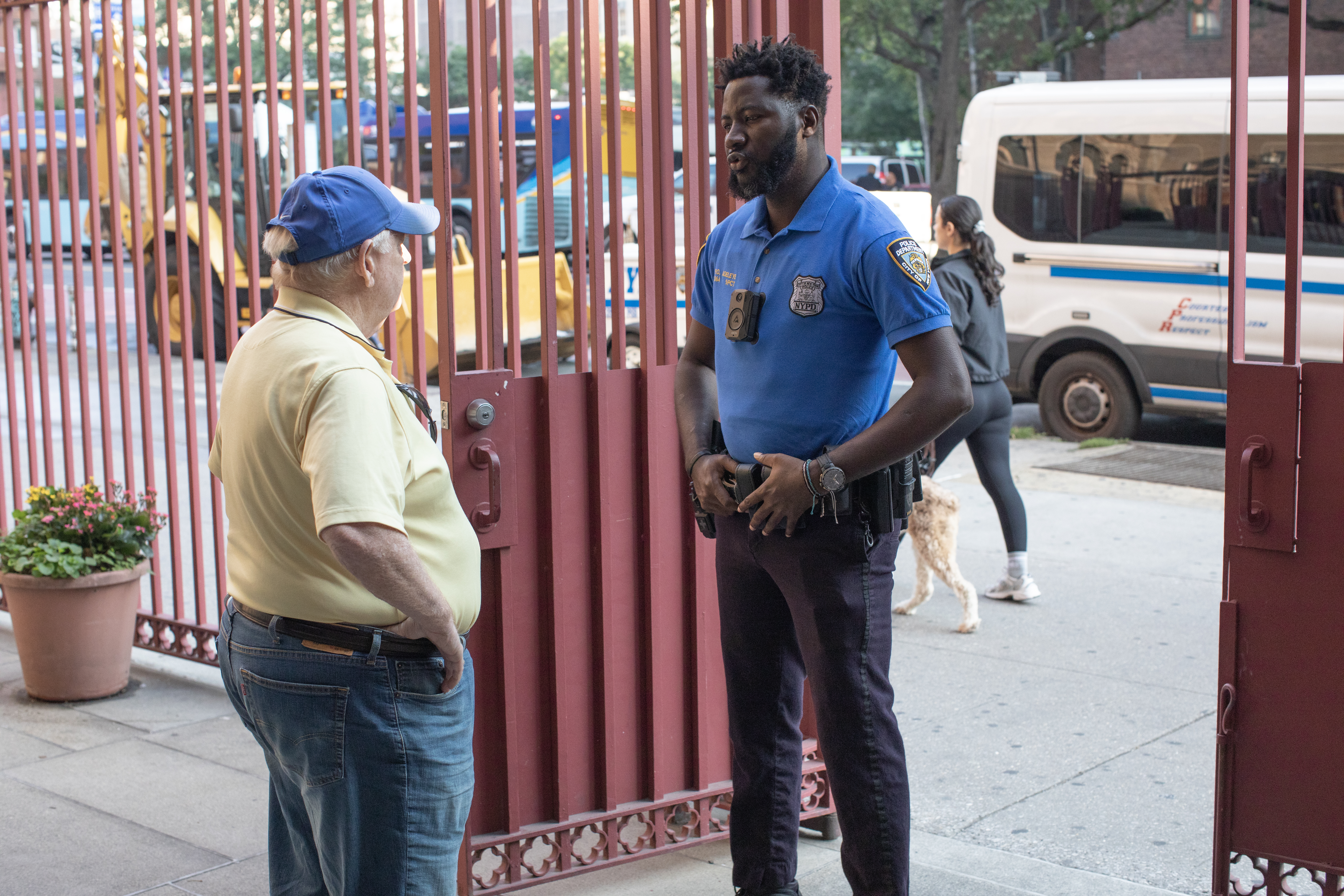
“Not everyone understands someone else’s problems,” Adeleye said. “So, finding solutions for people’s problems and answering their questions—I didn’t plan for any of this when I came from Nigeria, but I love it.”
In his formative years as a cop, Adeleye and his fellow NYPD officers saw their coverage area in and around the East Village drastically improve on all fronts. But they later witnessed a rapid decline when pandemic-era conditions along East 14th Street led to homeless encampments and a persistent string of crimes, including assaults and the deadly stabbing of a man this past June.
Rampant drug abuse and people suffering from mental illness—as well as the entire block between First Avenue and Avenue A turning into an unregulated open-air flea market each weekend—fueled the calamity by attracting more derelicts and inviting additional violence and disorder.
An influx of unlicensed street vendors usually selling items freshly stolen from local stores on the block, such as batteries, sneakers, and bars of soap, resulted in NYPD officers arresting the same offenders over and over again, with lenient criminal justice “reforms” acting as a revolving door of sorts.
“We know quality of life is very important, and all of my officers do a tremendous job of listening to issues from all over the neighborhood,” said Captain Pamela Jeronimo, commanding officer of the 9th Precinct. “But we have a criminal recidivist problem, too. Recidivists are arrested and, just as quickly, are right back out on the streets.”
While law enforcement experts continue to lobby politicians about “reforming the reforms,” NYPD cops at the patrol level have already begun implementing Mayor Eric Adams’ comprehensive interagency approach to cleaning up and revitalizing the busy commercial and residential corridor—which the mayor said will take sustained collaboration between the police and the city departments of Mental Health and Hygiene, Homeless Services, Sanitation, and more.
The mayor recently announced a $1-million effort to establish a new NYPD Mobile Command Center on East 14th Street, which also exists as the north-south dividing line between the 9th Precinct and Stuyvesant Town-Peter Cooper Village, a sprawling apartment complex in the neighboring 13th Precinct.
“It’s almost like a no-man’s land,” Mayor Adams said of East 14th Street. “But once you allow one person to set up as an illegal vendor or to sleep on the street, then someone else says, ‘Hey this is normalized.’ Well, this is not a problem that’s coming back to this area.”
The command vehicle will be a visible display of police omnipresence and will act as a central hub for law enforcement operations in the area. It will be equipped with state-of-the-art technology and resources, including computers, secure internet, lighting, and security cameras, and will be able to coordinate effective and efficient police responses to all manner of local crimes and conditions.
Meanwhile, Captain Jeronimo and her counterpart in the 13th Precinct, Deputy Inspector Daniel Orlando, have already increased the number of police officers on foot patrol on their respective sides of 14th Street—with promising results.
Serious crime in the East Village is down more than 30 percent so far this year compared to last year, with almost all major crime categories experiencing double-digit declines. Citywide, overall crime is 2.5 percent lower. Compared to the early 1990s, an era when New York logged about 2,000 murders a year across the five boroughs, major crime citywide this year is down more than 70 percent.
The issues along 14th Street, however, are largely driven by lower-level quality-of-life offenses that are not always as easily quantifiable. Success is in seeing it tidied up, in restoring a sense of safety and security to store owners and residents, and in connecting the impoverished with the help they so clearly need.
Quality-of-life issues will always be as important for the police and their partners to address as serious crime and violence, according to NYPD Commissioner Edward A. Caban, who added that the improving situation in the East Village shows that city government is guided by invaluable feedback gleaned from the people it serves.
“People need to not only be safe, but to feel safe, as well,” Commissioner Caban said. “Our coordinated strategy to reinvigorate this neighborhood should assure New Yorkers that every person and every business and every community matter.”
Back when Adeleye, the Nigerian immigrant, emerged from that international airline arrivals terminal, it immediately struck him that he was suddenly homeless and alone. After taking his first step off the curb outside Kennedy Airport, he located a West African man driving a taxicab and asked to be brought to the nearest African church.
For several days inside the Christ Apostolic Church in Jamaica, Queens, Adeleye was permitted to stay in a small utility room while he secured working papers. Pastor Abraham Obadare soon invited Adeleye to stay with him and his family in their home.
During the first three, difficult years of Adeleye’s new life, he worked hard as a stock clerk and the overnight security guard at a Bed, Bath, & Beyond store off Northern Boulevard, dutifully socking away every penny he earned as he started to shape his American dream.
A colleague urged him to apply to become an NYPD traffic agent, which he did, in 2010. A few years later, another friend pushed Adeleye to take the promotional exam to become a full-fledged police officer, an accomplishment he had never before imagined.
But, it turned out, public safety and community outreach came naturally to Adeleye—as it should: His mother worked as a police officer in Northern Nigeria for 35 years before she retired, and his older sister still serves as a soldier in the Nigerian Army.
“I never thought I was going to follow their paths,” said Adeleye, who did not know his father, who died when Adeleye was just 13 months old. Adeleye and his wife, whom he met in New York City while attending college classes, now have two children of their own.
On the street at work, Adeleye’s tall, commanding presence might be intimidating to someone who has never met him before. But his confident, engaging mannerisms are immediately disarming; they create friendships with one-time strangers.
Adeleye has never regretted that life-altering move he made to the United States and feels blessed to have found a rewarding vocation with the capacity to improve so many other people’s lives.
“All around the world, you hear about the opportunity in America,” he said. “And you hear that phrase, ‘As long as you’re willing to work.’ Well, I was willing to work.”
